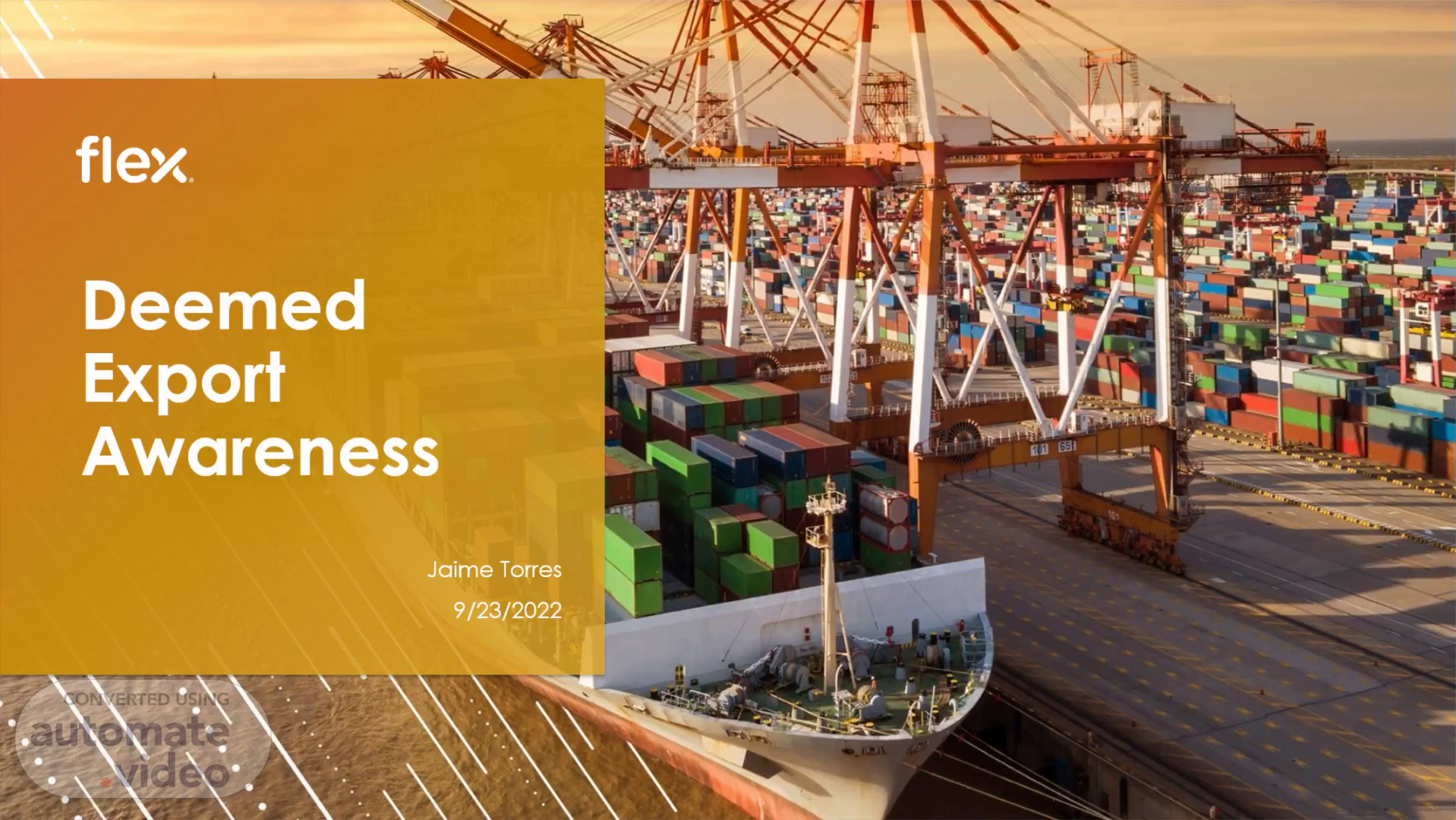
Deemed Export Awareness
Scene 1 (0s)
Deemed Export Awareness. Jaime Torres 9/23/2022.
Scene 2 (8s)
Export Overview.
Scene 3 (15s)
[Audio] There are 3 major components everyone exporting should focus on. Know Your customer – Never ship to any new entity unless the proper validation steps have been taken – Even the system used makes mistakes which may hold the shipment which is why you need to ensure you have full details of who you are shipping too * Watch for red flags. Perform Denied Party Screening ( Individuals, companies, organizations, countries) Anyone involved in the transaction. Product Classification – improper classification or no classification can either delay the shipment or even accumulate unnecessary duties/ fees * Product export classification is based on the level of export control on the product or technology. License Determination – proper classification also can affect if additional requirements are needed to export * License determination is based on the Product Classification and the country it is being exported..
Scene 4 (1m 23s)
[Audio] Denied Parties When performing a Denied party screening, there will be situations where the system might flag the logistics team with a required investigation before the export can take place. For example: " AI" is the abbreviation for " Apple International", but there is also a terrorist group with the same abbreviation. Once the investigation is complete, and the findings are communicated, the export can proceed..
Scene 5 (1m 55s)
[Audio] Product Classification Another reason why the export might be held back is due to missing classification of the item. If no classification is found by the system, it will also raise a flag and email the team to ensure the item is properly classified before the exporting can take place..
Scene 6 (2m 30s)
[Audio] License Determination: When exporting software or even some other products, the ECCN category matters. As you can see, this software was classified and assigned under 5A002, which is the ECCN code for " Inscription Software", which requires a lisence to be submitted before the exportation can take place..
Scene 7 (2m 58s)
Deemed Exports.
Scene 8 (3m 4s)
[Audio] What is a "Deemed Export"? An export is "Deemed" to take place when any item controlled by the United States Munitions List ( USML) or Commerce Control List ( CCL) such as Products, Equipment, Software or Technology, is exposed or accessible to a Foreign National ( FN) in any format in any country. If the FN is in the US, it is considered a "Deemed" Export. If it is another country, it is considered a "Deemed" re-export. Should they be exposed it is considered a violation of the International Traffic in Arms Regulations ( ITAR) and/or the Export Administration Regulations ( EAR) and is punishable by fines and or Jail. Examples of "Deemed" Exports are: Email: containing technical information on anything that is subject to the EAR Meetings: Verbal Discussions of any kind whether in a closed room or in a hallway where a FN can hear the discussion Visual: where a FN can see the controlled technology Documentation/technical data: spec sheets, diagrams, how to manufacture or a list of items required to manufacture the technology. This could be in either hard copy or digital/ system information..
Scene 10 (9m 37s)
[Audio] What else You Need to Know Keep your area clear if you are not at your station No technical documents, none of these documents should be left out if you are not using them: Data sheets Diagrams Manufacturing Information instructions Do not discuss the technology with anyone unless they work on the same project as you. Do not discuss the technology with anyone outside of your area. Be mindful of your e-mails, do not share technology information through e-mail. If you receive an email with technical information, make sure it is not visible. Do not leave your computer unlocked when not using it. If they see your screen, they have access to the technology. The information security policy prohibits leaving your area without locking your computer. Check the badges of the workers in your area, if they do not have the EAR sticker or ITAR printed on their badge, ask them to politely leave and report the violation to Trade Compliance team..
Scene 11 (10m 50s)
[Audio] Penalties for Violations EAR violation may be enforced both criminally and civilly. Maximum criminal penalties are 20 years in jail, a $ 1 million fine, or both. Maximum civil penalties are the greater of $ 250,000 or twice the value of the transaction, per violation. BIS can also deny export privileges eliminating our ability to do international trade for any customer. As well as losing Flex's right to do trade (being added to the Sanctioned Parties List).
Scene 12 (11m 28s)
[Audio] Summary All technology that is controlled by the International Traffic in Arms Regulation or The Export Administration Regulations must not be visible or accessible to anyone that is not a US Citizen, Permanent Resident / Green Card Holder or a Protected Individual, and as far as SLB is concerned, FN under a work Visa as well. IF YOU DON'T KNOW, ASK!.